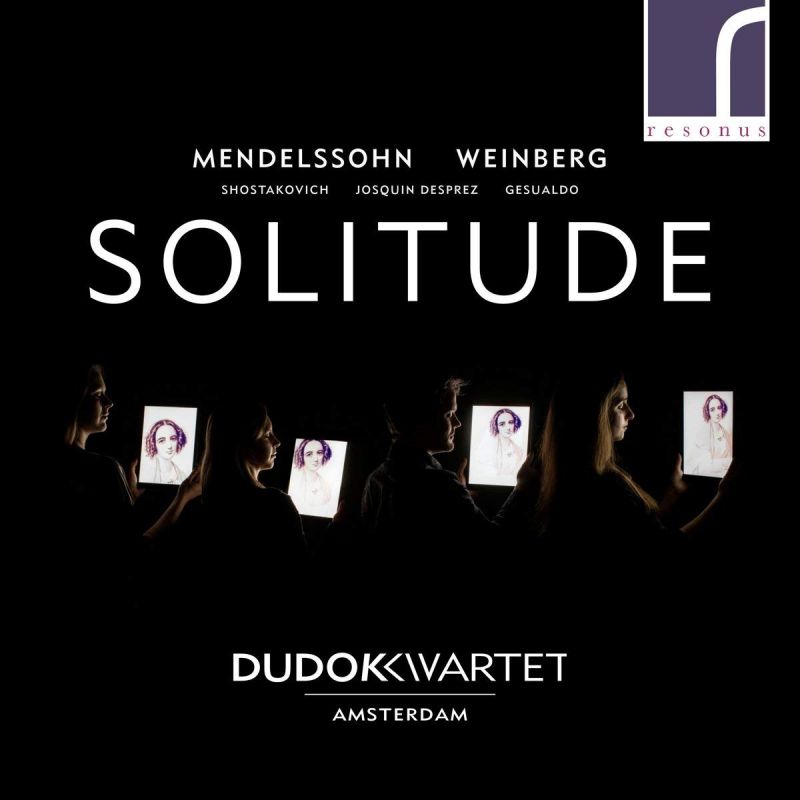Solitude (Dudok Quartet)
View record and artist detailsRecord and Artist Details
Composer or Director: Josquin Desprez, Felix Mendelssohn, Mieczyslaw Weinberg, Carlo (Prince of Venosa, Count of Conza) Gesualdo, Dmitri Shostakovich
Genre:
Chamber
Label: Resonus Classics
Magazine Review Date: 09/2018
Media Format: CD or Download
Media Runtime: 55
Mastering:
DDD
Catalogue Number: RES10215

Tracks:
| Composition | Artist Credit |
|---|---|
| String Quartet No. 6 |
Felix Mendelssohn, Composer
Dudok Quartet Felix Mendelssohn, Composer |
| Mille regretz |
Josquin Desprez, Composer
Dudok Quartet Josquin Desprez, Composer |
| String Quartet No. 3 |
Mieczyslaw Weinberg, Composer
Dudok Quartet Mieczyslaw Weinberg, Composer |
| (2) Pieces for String Quartet, Movement: Elegy |
Dmitri Shostakovich, Composer
Dmitri Shostakovich, Composer Dudok Quartet |
| Moro, lasso, al mio duolo |
Carlo (Prince of Venosa,Count of Conza) Gesualdo, Composer
Carlo (Prince of Venosa,Count of Conza) Gesualdo, Composer Dudok Quartet |
Author: Harriet Smith
In a word, yes. The Dudok offer a driving account of the first movement of Mendelssohn’s last quartet, conveying vividly its rhetoric and sense of desperation, and their immaculate ensemble is very impressive. After an Allegro assai also high on grief, we reach the slow movement, which doesn’t find the fragility of emotion that makes the early Elias recording from 2006 so special. Even if the Dudok have less of a vocal sobbing quality to their playing, the sense of grief is still palpable. And, while the finale doesn’t perhaps have quite the same degree of febrile drive and desperation as the Elias and the hyper-reactive Ebène, it’s telling nonetheless.
From here we dive back in time to Josquin’s Mille regretz. How beautifully and directly this speaks to us from across the centuries in this sensitive arrangement by the Dudok’s cellist David Faber – a feat that is repeated in the Gesualdo that closes the disc, with the group paring back vibrato to great effect and relishing its searing harmonies. There’s plenty of raw emotion in the Dudok’s reading of Shostakovich’s concise Elegy, the first of his Two Pieces for string quartet, which predates the 15 quartets and is a borrowing from an aria from Lady Macbeth.
Weinberg’s Third Quartet comes from the following decade and is, like the Shostakovich, the work of a young man. The Dudok convey both the muscularity and the passages of quieter reflection in the driving opening Presto. Equally compelling is the extraordinary slow movement, with its unstable 5/4 time signature and its striking textures, from which the first violin offers a lonely soliloquy (here given a heartfelt intensity by Judith van Driel). The finale, built obsessively on a Shostakovian theme, gives all four players equal billing and veers between languor and abrupt bursts of energy, its changeability excellently caught by the Dudok.
Discover the world's largest classical music catalogue with Presto Music.

Gramophone Digital Club
- Digital Edition
- Digital Archive
- Reviews Database
- Full website access
From £8.75 / month
Subscribe
Gramophone Full Club
- Print Edition
- Digital Edition
- Digital Archive
- Reviews Database
- Full website access
From £11.00 / month
Subscribe
If you are a library, university or other organisation that would be interested in an institutional subscription to Gramophone please click here for further information.




